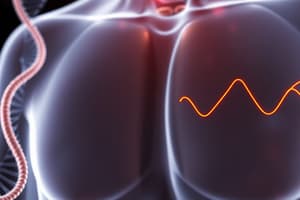Podcast
Questions and Answers
What is monitored in the blood of a child taking medication for hyperthyroidism?
What is monitored in the blood of a child taking medication for hyperthyroidism?
- Blood sugar levels
- White blood cell and platelet count (correct)
- Thyroid hormone levels
- Insulin levels
What is the reason for discontinuing medication in a child with hyperthyroidism?
What is the reason for discontinuing medication in a child with hyperthyroidism?
- Development of infection
- Occurrence of spontaneous bleeding
- Decreased white blood cell or platelet count (correct)
- All of the above
How long does it take for the medication to have an effect on hyperthyroidism?
How long does it take for the medication to have an effect on hyperthyroidism?
- 2 weeks (correct)
- 1 month
- 3 months
- 1 week
What is the alternative therapy for a child with a toxic reaction to medical management?
What is the alternative therapy for a child with a toxic reaction to medical management?
Why is it important to regulate adolescent girls with hyperthyroidism before childbearing?
Why is it important to regulate adolescent girls with hyperthyroidism before childbearing?
What is a common symptom of hyperthyroidism in children?
What is a common symptom of hyperthyroidism in children?
What is the usual cause of acute adrenocortical insufficiency?
What is the usual cause of acute adrenocortical insufficiency?
What is a possible consequence of untreated hypothyroidism in children?
What is a possible consequence of untreated hypothyroidism in children?
What is the effect of untreated hyperthyroidism on a child's bone growth?
What is the effect of untreated hyperthyroidism on a child's bone growth?
What can occur when corticosteroid therapy is abruptly stopped?
What can occur when corticosteroid therapy is abruptly stopped?
What may be necessary after radioiodine ablative therapy or thyroid surgery?
What may be necessary after radioiodine ablative therapy or thyroid surgery?
What is the treatment for true hypothyroidism in children?
What is the treatment for true hypothyroidism in children?
What is the purpose of administering a β-adrenergic blocking agent in the treatment of hyperthyroidism?
What is the purpose of administering a β-adrenergic blocking agent in the treatment of hyperthyroidism?
Why is supplemental vitamin D given to children with hypothyroidism?
Why is supplemental vitamin D given to children with hypothyroidism?
What is the effect of hyperthyroidism on a child's skin?
What is the effect of hyperthyroidism on a child's skin?
What is the purpose of administering an antithyroid drug in the treatment of hyperthyroidism?
What is the purpose of administering an antithyroid drug in the treatment of hyperthyroidism?
What is a sign of hyperthyroidism in children?
What is a sign of hyperthyroidism in children?
How often should the medication dosage of thyroid hormone be monitored in children with hypothyroidism?
How often should the medication dosage of thyroid hormone be monitored in children with hypothyroidism?
What is a common laboratory finding in children with hyperthyroidism?
What is a common laboratory finding in children with hyperthyroidism?
What is a possible complication of untreated hyperthyroidism in children?
What is a possible complication of untreated hyperthyroidism in children?
What happens if the dose of thyroid hormone is not adequate in children with hypothyroidism?
What happens if the dose of thyroid hormone is not adequate in children with hypothyroidism?
What is the appearance of the thyroid gland in children with hyperthyroidism?
What is the appearance of the thyroid gland in children with hyperthyroidism?
Why is it important to crush T4 tablets and add them to a small amount of food or formula?
Why is it important to crush T4 tablets and add them to a small amount of food or formula?
What is the benefit of early treatment of hypothyroidism in children?
What is the benefit of early treatment of hypothyroidism in children?
Study Notes
Hyperthyroidism in Children
- Overproduction of T3 and T4 hormones leads to nervousness, tremors, loss of muscle strength, and fatigue in children.
- Symptoms include increased basal metabolic rate, blood pressure, and pulse, as well as moist skin and excessive sweating.
- Children may experience increased hunger but fail to gain weight due to increased metabolic rate.
- Bone age appears advanced on X-ray, and epiphyseal lines may close prematurely, preventing full height attainment.
- The thyroid gland becomes prominent, and exophthalmia may occur in some cases.
- Laboratory tests reveal elevated T4 and T3 levels, increased radioactive iodine uptake, and low or absent TSH.
Therapeutic Management
- Therapy involves β-adrenergic blocking agents (e.g., propranolol) to decrease antibody response, followed by antithyroid drugs (e.g., propylthiouracil or methimazole) to suppress T4 formation.
- Monitoring is necessary for leukopenia and thrombocytopenia, which are side effects of these drugs.
- Radioiodine ablative therapy or thyroid surgery may be necessary in cases of toxic reaction or noncompliance.
- Supplemental thyroid hormone therapy may be required indefinitely after radioiodine ablative therapy or thyroidectomy.
Acute Adrenocortical Insufficiency
- Insufficiency can occur in acute or chronic forms, leading to nonproductive adrenal gland function.
- Causes include severe infections (e.g., meningococcemia) or abrupt cessation of long-term corticosteroid therapy.
- Untreated, the condition can result in severe, irreversible cognitive deterioration or delay.
- Treatment involves synthetic cortisol replacement therapy, with dosage adjustments based on the child's response.
Hypothyroidism
- Transient hypothyroidism typically resolves within 3 months.
- True hypothyroidism requires oral administration of synthetic thyroid hormone (sodium levothyroxine), which must be continued indefinitely.
- Supplemental vitamin D may be necessary to prevent rickets during rapid bone growth.
- Early treatment can prevent further cognitive challenges, but existing impairment cannot be reversed.
Studying That Suits You
Use AI to generate personalized quizzes and flashcards to suit your learning preferences.
Description
This quiz assesses understanding of symptoms and effects of excessive thyroid hormone production in children, including physical and behavioral changes. It covers the impact on metabolism, growth, and overall health.




